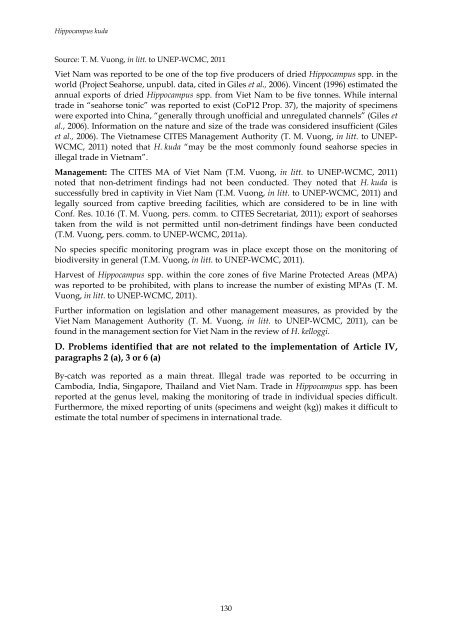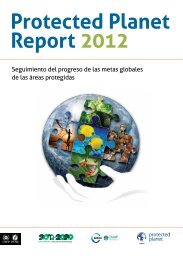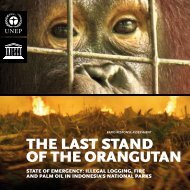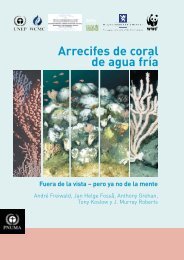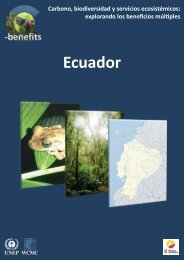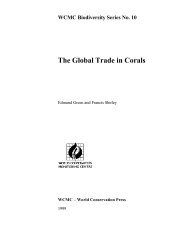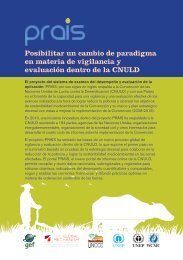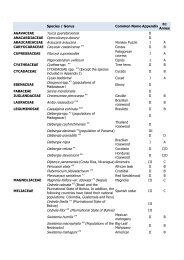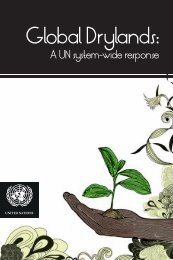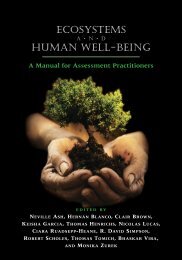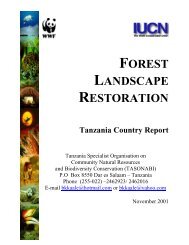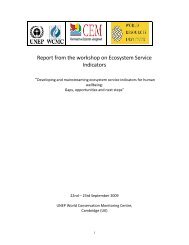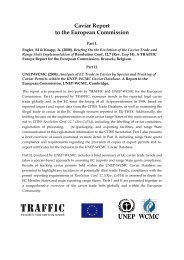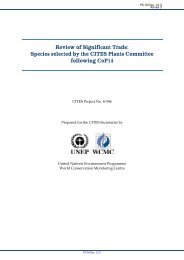2012. Review of Significant Trade - Cites
2012. Review of Significant Trade - Cites
2012. Review of Significant Trade - Cites
You also want an ePaper? Increase the reach of your titles
YUMPU automatically turns print PDFs into web optimized ePapers that Google loves.
Hippocampus kuda<br />
Source: T. M. Vuong, in litt. to UNEP-WCMC, 2011<br />
Viet Nam was reported to be one <strong>of</strong> the top five producers <strong>of</strong> dried Hippocampus spp. in the<br />
world (Project Seahorse, unpubl. data, cited in Giles et al., 2006). Vincent (1996) estimated the<br />
annual exports <strong>of</strong> dried Hippocampus spp. from Viet Nam to be five tonnes. While internal<br />
trade in “seahorse tonic” was reported to exist (CoP12 Prop. 37), the majority <strong>of</strong> specimens<br />
were exported into China, “generally through un<strong>of</strong>ficial and unregulated channels” (Giles et<br />
al., 2006). Information on the nature and size <strong>of</strong> the trade was considered insufficient (Giles<br />
et al., 2006). The Vietnamese CITES Management Authority (T. M. Vuong, in litt. to UNEP-<br />
WCMC, 2011) noted that H. kuda “may be the most commonly found seahorse species in<br />
illegal trade in Vietnam”.<br />
Management: The CITES MA <strong>of</strong> Viet Nam (T.M. Vuong, in litt. to UNEP-WCMC, 2011)<br />
noted that non-detriment findings had not been conducted. They noted that H. kuda is<br />
successfully bred in captivity in Viet Nam (T.M. Vuong, in litt. to UNEP-WCMC, 2011) and<br />
legally sourced from captive breeding facilities, which are considered to be in line with<br />
Conf. Res. 10.16 (T. M. Vuong, pers. comm. to CITES Secretariat, 2011); export <strong>of</strong> seahorses<br />
taken from the wild is not permitted until non-detriment findings have been conducted<br />
(T.M. Vuong, pers. comm. to UNEP-WCMC, 2011a).<br />
No species specific monitoring program was in place except those on the monitoring <strong>of</strong><br />
biodiversity in general (T.M. Vuong, in litt. to UNEP-WCMC, 2011).<br />
Harvest <strong>of</strong> Hippocampus spp. within the core zones <strong>of</strong> five Marine Protected Areas (MPA)<br />
was reported to be prohibited, with plans to increase the number <strong>of</strong> existing MPAs (T. M.<br />
Vuong, in litt. to UNEP-WCMC, 2011).<br />
Further information on legislation and other management measures, as provided by the<br />
Viet Nam Management Authority (T. M. Vuong, in litt. to UNEP-WCMC, 2011), can be<br />
found in the management section for Viet Nam in the review <strong>of</strong> H. kelloggi.<br />
D. Problems identified that are not related to the implementation <strong>of</strong> Article IV,<br />
paragraphs 2 (a), 3 or 6 (a)<br />
By-catch was reported as a main threat. Illegal trade was reported to be occurring in<br />
Cambodia, India, Singapore, Thailand and Viet Nam. <strong>Trade</strong> in Hippocampus spp. has been<br />
reported at the genus level, making the monitoring <strong>of</strong> trade in individual species difficult.<br />
Furthermore, the mixed reporting <strong>of</strong> units (specimens and weight (kg)) makes it difficult to<br />
estimate the total number <strong>of</strong> specimens in international trade.<br />
130


